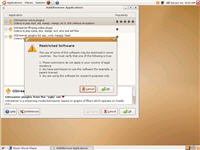Why don't Linux distros make legal codecs easier to find?

A few weeks ago I took a look at how Ubuntu 7.04 handled proprietary file formats such as MP3, WMA and QuickTime movies. Overall the support was good (although I couldn't get QuickTime 7 movie support working) but it seriously bothered me that I had to resort to downloading and making use of codecs which are, well, to be blunt, illegal to use.
It's pretty easy to get access to these illegal, or as Linux calls them, "restricted software," codecs. To get MP3 support you click on any MP3 file which brings up Totem Movie Player and tries to play the file. When it fails to play the file the system asks for permission to go off and search for a suitable codec. After a quick search the appropriate codecs are found. So far, so good.
Now things become dodgy. Choosing to install the codec then brings up a message which is stuffed with legal mumbo jumbo that makes me want to talk to a lawyer. Here's the message:
Restricted Software The use of some of the software may be restricted in some countries. You must verify that one of the following is true: 1. These restrictions do not apply in your country of legal residence. 2. You have permission to use the software (for example, a patent license). 3. You are using this software for research purposes only.

If you're the kind of person that's happy to indulge in file swapping or installing pirate software, this kind of warning is not going to mean anything, but if you try your best to stay on the right side of the law (no matter whether you agree with the law or not), this is likely to stop you in your tracks.
But there is an alternative. There are legal codecs available for purchase as long as you know where to look for them. Fluendo has a fully legal codec pack available for purchase which costs €28 (around $40). This pack gives you GStreamer plugins for the following:
- Windows Media Audio Decoder
- Windows Media Video Decoder
- Windows Media ASF Demuxer
- Windows Media MMS Networking
- MPEG2 Video Decoder
- MPEG4 Video Decoder
- MPEG2 Program Stream and Transport Stream demuxer
- MPEG4 ISO Demuxer
- MP3 Audio Decoder
- AC3 Audio Decoder
If you don't want the entire codec bundle, you can buy them separately.
OK, so there's perfectly legal codecs available for Linux - so why am I being offered illegal codecs? Why don't I just get a link to the Fluendo website and told that if support for certain file formats if going to cost me? Failing that, what's wrong with adding a few words to the legal mumbo jumbo dialog box about the paid for codecs? It would be handy for people to have a $40 escape route to avoid having to wade through the legalese.
I know what some of you are going to say - these codecs are legal in some countries so why shouldn't they be offered? Yes, fine, good point. But in that case make more information available so that individuals have access to the information they need to come to an informed decision. As it stands, the current situation just seems like a convenient way to make Linux seem like a completely free solution and offload the legal burden onto the end user.
The bottom line is that no matter how the Free Software Foundation try to spin it, some things will never be free.
Thoughts?